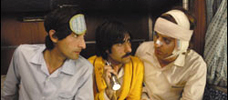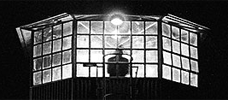Reviews
Gus Van Sant
France/USA, 2007
Credits
Review by Jenny Jediny
Posted on 05 October 2007
Source MK2 Productions 35mm print
Categories The 45th New York Film Festival
Analogous to 2003’s Elephant, Gus Van Sant’s Paranoid Park is set in a self-contained high school universe, primarily dwelling on mundane activities that have been or will be punctured by an unexpected and in both cases tragic event. While my initial reaction to Elephant was lukewarm, Paranoid Park, albeit not overburdened with a recent, polarizing national incident, struck me as a tighter, more intricate meditation on teenage oblivion. It is undoubtedly more accessible than Van Sant’s recent work, particularly the haunting and often impermeable Last Days, but by no means does this detract from Paranoid Park’s potency as an absorbing, brief impression of a rash action and its aftermath.
Revealing Alex’s mistake will not spoil the film, as Van Sant is far more interested in its consequences. At the center of Paranoid Park is a fatal error: confronted by a security guard while illegally riding a freight train, Alex accidentally causes the man’s death and flees the scene of the crime. This is the mistake the film - and Alex - unravels, moving backward and forward in time, often repeating itself to express the confusion and denial surrounding the incident. Unlike Elephant, the film lacks the dread of waiting, the expectation of an inevitable horror that will eventually unfold—instead, the encounter between Alex and the security guard has already occurred when Paranoid Park begins and is only fully seen in flashback about halfway through. Removing the homicide as a focal point allows the film to breathe and take shape around Alex’s alternating distress and disengagement.
Van Sant’s portrayal of teenagers is incredibly astute; casting via MySpace sounds gimmicky, but actually lends more credibility to the film. There are no distractions that might have occurred if Van Sant had cast the latest teen sensation as Alex (Shia LaBeouf, anyone?), and the awkwardness stemming from some of the performance feels more like teenage fumbling and self-consciousness than unconvincing acting. The kids are center stage throughout, through both script and cinematography. The framing is often tight, literally and figuratively blocking out adults in the background and essentially any part of the outside world that is not Alex’s immediate concern.
This beautifully expressed state of self-absorption enables a greater sense of isolation after Alex commits his crime. One of the most visually eloquent scenes is a tightly shot close-up of Alex’s face while he showers, directly after leaving the train yard. As the stream of water forms seemingly solid strands that flow past his long hair, the rushing sound of water surges with the cacophony of tropical birds—a gorgeous noise, it envelops Alex just as his guilt overwhelms him. Leslie Shatz, the sound designer who has worked with Van Sant on numerous films, layers Paranoid Park with terrific, palpable sounds that overtake scenes and directly contribute to the film’s inward focus.
While Alex experiences an immediate guilt, it becomes buried under the apprehension of being found out. The police visit his high school after finding his skateboard, which they correctly suspect as a link to the crime, and question not only Alex but his fellow skateboarders. Skateboarding is passionately portrayed, another aspect of Alex’s life unaccompanied by adults, but not nearly as solitary. Christopher Doyle, Wong Kar-wai’s cinematographer of choice, films the skateboarders in operatic slow motion, with expansive shots that encompass the wide community that has built up around the sport, and the local skating park itself. Van Sant, adept at capturing subcultures (perhaps my favorite being the male prostitutes of My Own Private Idaho), often skews the outsiders not necessarily as acceptable, but far more in touch with philosophy and able to better communicate than those adhering to the status quo. While Alex wouldn’t necessarily confess to the police, it doesn’t help that the visiting detective talks to him as if he was a small child, and uses the cringe-inducing phrase “When I was your age.” The adults in this film are out of touch, not simply because their children envision them so; both the police and Alex’s parents, wrapped up in their divorce, demonstrate a noticeable, if unintentional, ignorance.
Alex must confess though, if only to himself, and does so in a journal that is expressed to the audience through voice-over. Unpolished and meandering, the journal is addressed to a friend who will never read it, as Alex writes to assuage his own guilt and perhaps to try to make sense of what exactly has occurred, not what he has done. Alex’s conscious decision to remain silent establishes a significant moral ambiguity that is applicable beyond the circumstances of what has happened to one boy in Portland, Oregon. As with his recent work, it becomes clear that Van Sant has become not only an essential auteur, but more specifically an American one, concentrating on and drawing from emotional rhythms that pulse within this country. As Paranoid Park concludes, the punishment that is threatened never materializes, and it becomes all too easy to push actions under the rug. Life will in fact continue, in the same way that Van Sant has captured it throughout: indifferent, unfocused, and with little concern for consequence.
More The 45th New York Film Festival
-

The Darjeeling Limited
2007 -

Hamlet
1921 -

The Romance of Astrea and Celadon
2007 -

Secret Sunshine
2007 -

Paranoid Park
2007 -

Alexandra
2007 -

Before the Devil Knows You’re Dead
2007 -

The Diving Bell and the Butterfly
2007 -

The Last Mistress
2007 -

The Man from London
2007 -

I’m Not There
2007
We don’t do comments anymore, but you may contact us here or find us on Twitter or Facebook.



